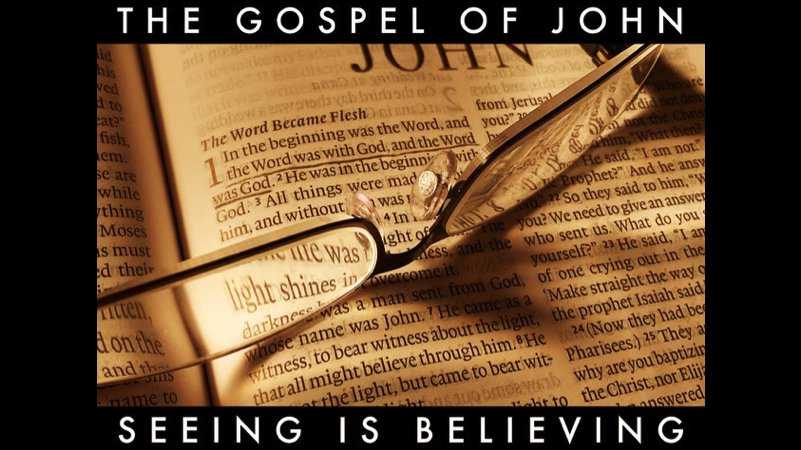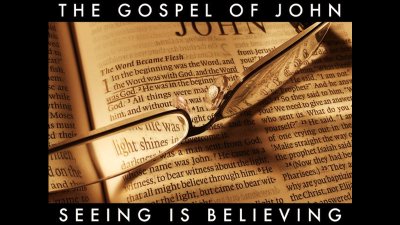Sermon Introduction
Baptisms and Bridegrooms and Beliefs, oh my.
This Sunday, we will see all of these things in action, as we take another look at John 3.
In verses 22–36, we will find another priestly figure in Israel who has to make a decision about Jesus. Only this time the response will be different. Whereas Nicodemus came to the Lord in the darkness of night, John the Baptist will see Jesus by the light of the day. And in the light of day, Jesus is seen baptizing. That is to say, he is doing what John has been doing. And recognizing the turf war that is about to take place, John’s disciples go to their teacher concerned about John’s future.
Yet, instead of resisting Jesus, fighting for his ministry and his baptism, John submits himself to the Lord and demonstrates what true and humble faith looks like. Not only does John’s obedient faith stand in contrast to Nicodemus’s false faith, but it invites us to consider how we respond to Jesus, when he takes away our place of ministry and prominence.
Can we say with gladness that I must decrease in order for Jesus to increase?
Sunday, we will look carefully at the two baptisms of Jesus and John, as well as the way the friend of the bridegroom points to the groom. To prepare for Sunday, read over John 3 and pray for God to lead us out of darkness and into the light. If you are looking to better understand John 2–4, this blogpost might be helpful. And if baptism, especially baptism by immersion, is still a question for you, this blogpost on John 3 may also help.
Studying John has been a deep joy for me, and I look forward to sharing the gospel goodness of John 3 on Sunday. May the Lord grant us grace to gather and to see the glory of his Son.
For His Glory and your joy,
Pastor David
-----------------------------------------------------------------------------------------------------------------------------
Discussion & Response Questions
1. How does seeing the parallelism between Nicodemus (3:1–21) and John (3:22–36) help us understand John’s message?
2. What is the main point of the passage?
3. How might this passage inform our understanding of the doctrine of baptism?
4. How is John’s baptism different from Christian baptism?
5. How does baptism relate to the new birth? Water baptism relate to baptism in the Spirit?
6. What might we learn from John’s response to his disciples about the departure of his followers?
7. Why is John joyful in his diminishment?
8. Who is being contrasted in verses 31-36? What is the composite picture of each person?
9. What truths does this text reveal about our Triune God and the working of Father, Son, and Spirit in accomplishing salvation?
10. What does it mean to obey the Son in verse 36? (See also Romans 1:1-6 and 16:25-27).
11. How ought we to respond to these truths?
Well, Well, Well: A Marriage, a Mountain, and a Messiah: Part 1 (John 4:1-18)
February 27, 2022 • David Schrock • John 4:1–15
O Love That Will Not Let Me Go: How Jesus Restores Souls and Prepares Living Sacrifices
April 30, 2023 • David Schrock • John 21:15–25
After 4 years, 55 sermons, and 1 pandemic, we come to the final message of John. Or least, the final message in this sermon series. Every time we finish a sermon series, I stand amazed at the kindness of God. He has spoken to us, he has sustained us, and he has fed us with this Word. And actually, on that point, it is fitting that we spend our final Sunday in this series chewing on the ways that God feeds us with his Word. For this is what he told Peter to go and do! As you prepare for Sunday, take time to read John 21 and also, give thanks to God for the way his Word feeds us. In my Bible reading, Psalm 119 is on my calendar tomorrow. The 29th day of the fourth month = Psalm 119; it’s not gematria, but I guess its close. And for those looking to prepare their hearts to feed on God’s Word, Psalm 119 (some or all of it) would be a fitting way to pray for our time on Sunday. May God be praised that he has led us through this glorious book. And may we gather on Sunday with anticipation that he will feed us again. As the Lord allows, I look forward to seeing you on Sunday. As a reminder, the River Ridge Community Group is in the overflow this Sunday. For His Glory and your joy in Christ, Pastor David ----------------------------------------------------------------------------------------------------- Discussion & Response Questions for John 21:15 – 25 In this account we see three questions, three responses, and three exhortations. While there is repetition, there are distinct nuances between each of them. In the first question, what is Jesus’ specific question about Peter’s love? How does Jesus’ question change? (vv. 15, 16, 17) What should we observe about Peter’s answers? What tasks are being entrusted to Peter? What responsibilities are entrusted to him? As a sheep, what might we learn from this? What do we need? How do Jesus’ words provoke grief and give comfort to Peter? When we see that our love for the Lord is deficient, how should Scripture direct our hearts and minds? What truths should we turn to? What does Peter’s question about John reveal? How does Jesus conclude his words to Peter? How does this compare to the beginning? As we consider how the church has been built upon the foundation of the apostles, what applications should we draw from this text? How ought we to respond to this text?
A Tale of Two Fishermen: Jesus, Peter, and the Mission of God
April 23, 2023 • David Schrock • John 21:1–14, Ezekiel 47:1–12
A whole sermon about fishing, really? In a word, yes. This Sunday we are going to go fishing with Jesus and on the shores of Galilee we are going to see how Jesus turns a handful of fishermen into fishers of men. And remarkably, what we will see is not just a clever turn of phrase, but a glorious fulfillment of prophetic witness. Indeed, the Old Testament is filled with places that speak about fishing and in two places in particular (Jer. 16:16–21; Ezek. 47:1–12) we find promises that Jesus fulfills in John 21. As you prepare for Sunday, take time to read John 21, as well as these Old Testament passages. On Sunday, we will see how John shows the arrival of God’s kingdom through the fish, the fishing, and the fisherman in John 21. As the Lord allows, I look forward to seeing you on Sunday. For His Glory and your joy in Christ, Pastor David ------------------------------------------------------------------------------------------- Discussion & Response Questions for John 21:1 – 14 Fill in the gap between John 20 to John 21. How does the scene change from the disciples being in the Upper Room in Jerusalem? What does John continue to highlight in these verses? What repeats? How does that reveal his focus? As we read this narrative, elements of this story echo earlier events in the Gospels. Compare John 21 with Matthew 4:18-22. What is similar? What is different? How do they relate to OT prophecies (Jeremiah 16 and Ezekiel 47)? If Matthew 4:18–22 connects most explicitly to Jeremiah 16:16–21, how does John 21 apply Ezekiel 47:1–12? If John is applying Ezekiel 47 to Jesus’s catch of fish, how does that relate to the building of the temple and the outpouring of the Spirit? What is Jesus teaching his disciples? What about Jesus is being revealed to us? How should we respond to this text? What is the mission for us? Is it the same or different from the apostles? What encouragement does this passage give you?
Three Good Gifts: The Spirit of Peace, the Word of Faith, and the Book of Life
April 16, 2023 • David Schrock • John 20:19–31
If you joined us on Good Friday, you heard the good news that "https://na01.safelinks.protection.outlook.com/?url=https%3a%2f%2fobc.us14.list-manage.com%2ftrack%2fclick%3fu%3ddd23918991ea6f542a8065bed%26id%3d382873981c%26e%3df5b57025e0&data=05%7c01%7c%7c4649836d05e544cafed408db3d29170d%7c84df9e7fe9f640afb435aaaaaaaaaaaa%7c1%7c0%7c638171018919855739%7cunknown%7ctwfpbgzsb3d8eyjwijoimc4wljawmdailcjqijoiv2lumziilcjbtii6ik1hawwilcjxvci6mn0%3d%7c3000%7c%7c%7c&sdata=f2pe1m53j%2f0llc7nyrb5w%2brgdxwfapn1hcrnwixrzqi%3d&reserved=0" is a reference to the temple. On the cross, Jesus finished his temple building. Like God in Genesis 2, Moses in Exodus 40, and Hezekiah in 2 Chronicles 31, Jesus‘s words harken back to the completion of a temple. But if the cross finished the temple, what does that mean for us now? Where do we see the temple? And how does the finished work of Christ relate to the resurrection, the outpouring of the Spirit, and the formation of Spirit-filled temples (i.e., local churches)? To those questions, we will find answers this Sunday. In John 20:19–31, we will see the way that Jesus brings peace to his disciples, pours out his Spirit upon them, and begins to grant life to them. John even says that this is the purpose of his book. And so, as we draw to another meditation on Christ’s resurrection, we will see how the word of Christ, and the Spirit of God, and the word of Scripture bring life to all those who are made a part of Christ’s living and growing temple. As you have time, read over John 20, as well as, Acts 2. Sunday we will see the way that the Spirit of Truth begins to assemble the finished work of Christ. As you come, please pray for our church. Last Sunday, we had the joy of hosting more than 350 people at OBC. We continue to rejoice in those who are coming, even as we feel the stewardship of caring for all who join us. As a reminder, the Community Group scheduled for our overflow seating is the Montclair Community Group. If our parking lot is filled to maximum capacity, we encourage you to take advantage of the overflow parking along the shoulder of Springwoods Drive, and also at Old Bridge Veterinary Hospital. As the Lord allows, I look forward to seeing you on Sunday and worshiping our resurrected Christ. As we said last week and should say every Lord’s Day: He is risen. He is risen indeed. For His Glory and your joy in Christ, Pastor David -------------------------------------------------------------------------------------------------------------------- Discussion & Response Questions for John 20:19 – 31 How does Jesus greet his disciples (vv. 19, 21, 26). Why do you think he greets them in this way? (Cf. John 14:27; 16:33) How does the breathing of the Spirit relate to John’s Gospel? What is the significance to the number 10 — ten disciples receive the Spirit. So what? Consider the connection between the commissioning of the disciples and Jesus breathing on them. How do we understand this text about the Spirit in relationship to Pentecost? How would you explain what Jesus is teaching about forgiveness? How does the context shape our understanding of this? How does the church pronounce forgiveness today? By what authority does the church make this proclamation? Is it an authority given to individuals or churches? Why did John write his gospel? How does the Gospel give life today? Think about what just happened in vv. 19–29. Considering the thesis for John’s gospel, how does the drama of this book reach its height with Thomas? What have you believed about Jesus? Why have you believed? What is the encouragement for those who have not seen Jesus? What is the promise for all who believe? How should we respond to the Gospel of John?




